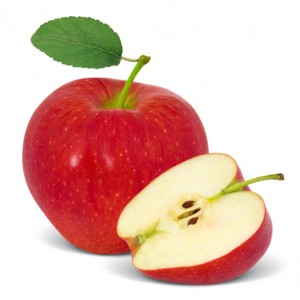The current Listeria monocytogenes outbreak linked to commercially prepared, prepackaged caramel apples is worrying. Twenty-eight people have been sickened and five have died so far in this multi-state outbreak. Caramel apples are not a food one usually associates with foodborne illness. But all raw produce can be contaminated with pathogenic bacteria.
 Almost all farm fields are irrigated with water, especially during droughts. That water can be contaminated with any kind of bacteria. And fertilizers made from manure can contain bacteria. When that bacteria gets onto fruits or vegetables it attaches to the produce and produces a biofilm that protects the bacteria and helps it grow.
Almost all farm fields are irrigated with water, especially during droughts. That water can be contaminated with any kind of bacteria. And fertilizers made from manure can contain bacteria. When that bacteria gets onto fruits or vegetables it attaches to the produce and produces a biofilm that protects the bacteria and helps it grow.
Produce can be contaminated with bacteria at any time along the supply chain, from the fields to the packing house to the trucks used to bring the items to the marketplace. Any worker who is ill can transfer bacteria to the fruits and vegetables. If the produce isn’t cooled quickly enough after harvest, the bacteria can grow and get a foothold before any preventive measures are applied. Apples are supposed to be kept off the ground and the baskets or boxes they are stored in are not supposed to touch the ground either. But these rules aren’t always followed.
Fred Pritzker, food safety attorney who has represented many clients over the years said of this outbreak, “There are many unknowns at this point but if history is any guide, something in the production of this product went horribly wrong. We will find out what happened and who is responsible. I can say this: in this day and age, a Listeria outbreak of this magnitude simply should not happen.”
Food processors are supposed to clean produce well before it is sold to consumers, and many do. But some processors do not take the steps necessary to reduce the risk of pathogenic bacterial contamination or growth on fruits and vegetables. Machines may not be cleaned often enough, or may be too old. Employees may not wash their hands thoroughly before handling the food, or a critical control point step may be skipped.
To protect yourself, always wash your hands before handling any food and thoroughly wash and scrub produce under cool running water before eating. Peeling fruits and vegetables can help reduce the risk of illness, but only after they have been thoroughly rinsed. Produce washes will not kill all bacteria, so don’t rely on them to protect you.
And be sure you don’t eat any commercially produced, prepackaged caramel apples until the CDC says it’s okay. Listeriosis, the illness caused by Listeria monocytogenes bacteria, can take up to 70 days to appear after you’ve been exposed. If you have eaten any caramel apples this fall, monitor yourself for the symptoms of the illness, which include fever, headache, stiff neck, nausea, and flu-like symptoms. If you do get sick, see your doctor immediately and tell her you ate a caramel apple.





Environmental contamination from the food processing facility itself is another important source of Listeria monocytogenes. I suspect that issues with sanitation will be found at the plant, possibly cold storage rooms.